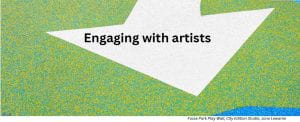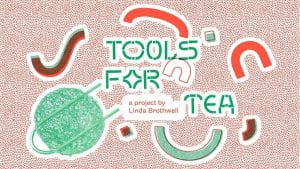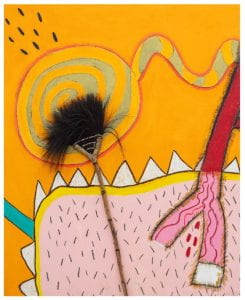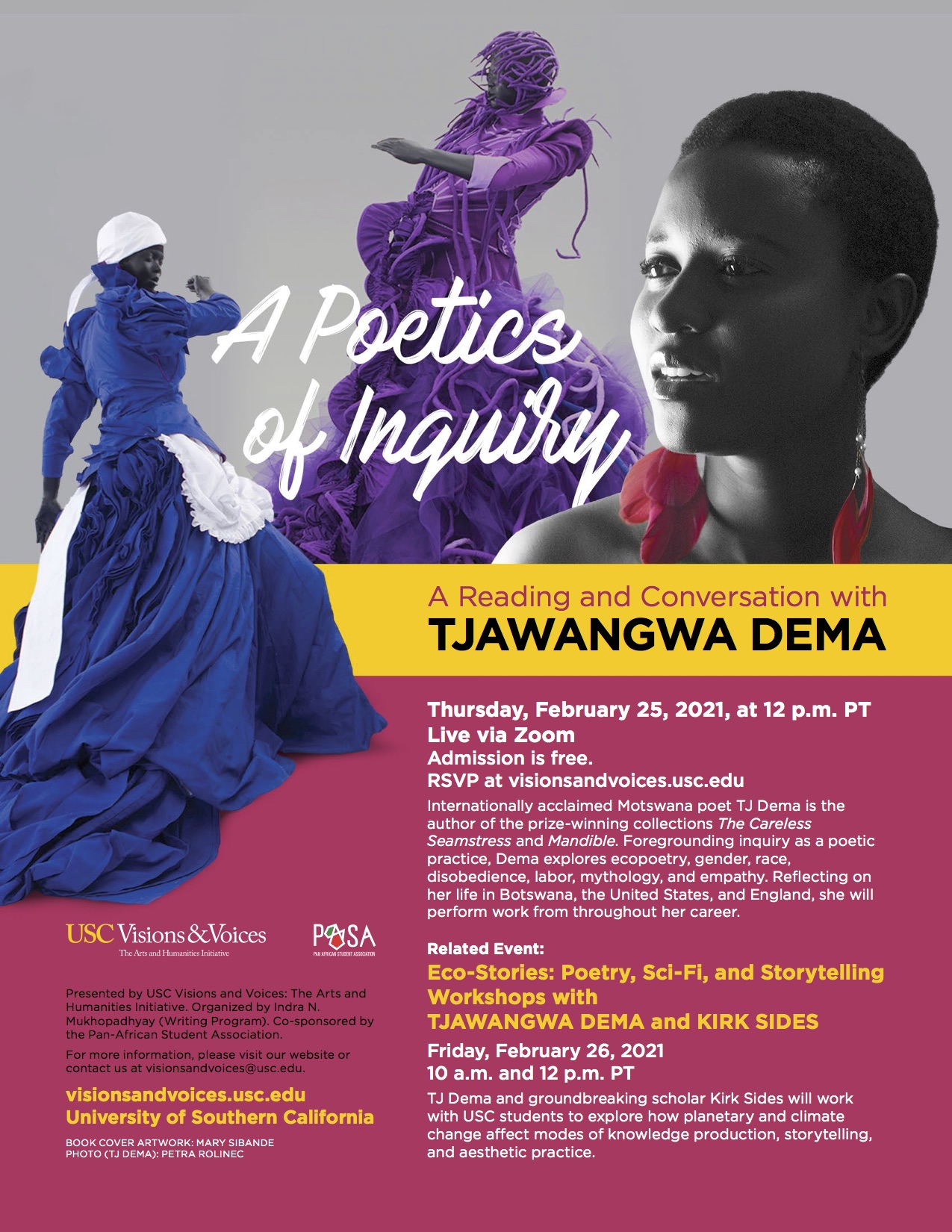Call for Papers
The Aesthetics of Geopower: Imagining Planetary Histories and Hegemonies
4 & 5 April 2024, University of Amsterdam | Deadline for proposals: 15 October 2023.
Keynote Speaker:
Macarena Gómez-Barris (Brown University, author of The Extractive Zone: Social Ecologies and Decolonial Perspectives, Duke University Press, 2017)
For this two-day, single-stream, and in-person conference, sponsored by the Amsterdam School for Cultural Analysis and Dutch Research Council, scholars are invited to explore how the human and nonhuman forces shaping and emerging from the earth are articulated in art and cultural practice.
If the earth was once passed off as a neutral backdrop to human life, in the present age of ecological derangement it has reemerged as fraught with relations of power and politics. In this context, cultural theorists have put forward the rubric of geopower to conceptualize the ways that power is exerted over and through but also by the earth (Clare 2013; Neyrat 2019; Yusoff 2018). Having long been entangled with extractive, racial capitalism (Bain 2023, 1-2), geopower is becoming especially visible amid climate change and discourses of the Anthropocene. From proposals for solar geoengineering to legislation extending legal personhood to ecological entities such as the Ganga River, contemporary manifestations of geopower indicate how politics and planetarity are colliding in complex ways that are increasingly defining the present and will shape the future.
Extrapolated from Michel Foucault’s thinking of biopower, geopower—or “geontopower” in Elizabeth A. Povinelli’s alternative formulation (2016)—has been theorized along several overlapping trajectories (Tola 2022; Luisetti 2019). For some, it primarily signifies the “government of the earth” (Diran & Traisnel 2019, 44) and implicates the technologies and tactics through which dominant subjects frame and exploit not just terrestrial environments but those “defined into nature” under patriarchal and colonial orders (Caputi 2020, 183). For another strand of theory, which draws on posthuman philosophies of life and matter (esp. Grosz 2008), geopower names the nonhuman forces of the earth, which permeate, condition, but also often disrupt or imperil humanly regulated environments (Clark 2011; Grosz, Yusoff, & Clark 2017).
Building on these developments, this conference explores how geopower intersects with aesthetics, taken expansively as referring to art, film, literature, and other forms of cultural practice, as well as sensed materiality and embodied perception. Our premise is that the aesthetic, far from being secondary or supplemental to the forces shaping the earth, is centrally entailed and embedded in dynamics of geopower. This can be seen in the visual construction of “the Earth system” as an object of calculation, conservation, and control, or in scholarly, literary, and filmic narratives of the Anthropocene, which cast different human subjects as planetary culprits or custodians (Bonneuil & Fressoz 2016). The earth’s inhuman forces, meanwhile, have a transgressive vitality that often registers aesthetically and might be articulated in artistic practice (Sheikh 2017). Such forces suffuse cultural practice even when not explicitly thematized, whether because some artistic scenes are economically aligned with particular regimes of resource extraction (Acosta 2020) or because cultural works are necessarily composed of planetary materialities, which precede and exceed discursive or authorial framings of the aesthetic (Parikka 2015).
To probe the connections among power, planetarity, and the aesthetic, we call on scholars, critics, and practitioners across disciplines to reflect on how diverse formations of geopower are enabled and mediated, but also challenged in cultural practice. How do conceptual, visual, poetic, or narratological framings of the earth calibrate social approaches to environments? Which marginalized perspectives can be brought forward to develop alternative representations or counter-histories of geopower? How is it imbricated with racializing, (neo)colonial, and cisheteropatriarchal orders? And how might theories of geopower be rethought by attending to its material manifestations or reimagined in literary and artistic experiment?
In addressing these and other questions pertaining to the aesthetics of geopower, contributors are invited to explore narratives, images, and practices relating to any genre or medium, or events, discourses, and materialities in any historical and geographical context. Possible topics might include (but are not limited to):
—cross-cultural perspectives on/representations of the earth as an aesthetic object;
—the significance of land and planetary forces in decolonial thought and practice;
—the aesthetics of geoengineering, from speculation to design;
—climate fiction and narrative constructions of geopower;
—articulations of the earth’s materialities in the arts and cultural practice;
—the role of mapping, remote sensing, and technological mediation in planetary governance;
—the politics and aesthetics of “deep time” imaginaries;
—Embodied and multi-sensory apprehensions of planetary power;
—representations of resource extraction and new commodity frontiers;
—the aestheticization of planetary forces that exceed and transcend the human;
—creative interventions that make visible the inequities and injustices of geopower.
Submission
Please submit abstracts (max. 300 words for 20 minute presentations) and a short biographical note (max. 250 words) to aestheticsgeopower@gmail.com by 15 October 2023.
Kindly send submissions as a single pdf document of max. two pages. To deepen mutual engagement, papers will be circulated a week before the conference; each participant will be assigned a respondent and asked to act as primary respondent to an assigned paper in return. Selected papers will be invited for inclusion in an edited volume. No conference fees will be charged.
Organized by Dr Simon Ferdinand (www.simonferdinand.com) and Dr Colin Sterling (www.colinsterling.com) of the University of Amsterdam.
References
Acosta, Santiago, We Are Like Oil: An Ecology of the Venezuelan Culture Boom, 1973-1983 (PhD. dissertation, New York: Columbia University, 2020).
Bain, Kimberly, “Black Soil,” Social Text 41.1 (2023): 1-19.
Bonneuil, Christrophe, and Jean-Baptiste Fressoz, The Shock of the Anthropocene (London: Verso, 2016).
Caputi, Jane, Call Your “Mutha”: A Deliberately Dirty-Minded Manifesto for the Earth Mother in the Anthropocene (Oxford: Oxford University Press, 2020).
Clare, Stephanie, “Geopower: The Politics of Life and Land in Frantz Fanon’s Writing,” Diacritics 41.4 (2013): 60-80.
Clark, Nigel, Inhuman Nature: Sociable Life on a Dynamic Planet (London: Sage, 2010).
Diran, Ingrid, and Antoine Traisnel, “The Birth of Geopower,” Diacritics 47.3 (2019): 32-51.
Grosz, Elizabeth, Chaos, Territory, Art: Deleuze and the Framing of the Earth (New York: Columbia University Press, 2008).
Grosz, Elizabeth, Kathryn Yusoff, and Nigel Clark, “An Interview with Elizabeth Grosz: Geopower, Inhumanism and the Biopolitical,” Theory, Culture, & Society 34. 2-3 (2017): 129-46.
Luisetti, Federico, “Geopower: On the States of Nature of Late Capitalism,” European Journal of Social Theory 22.3 (2018): 342-63.
Neyrat, Frédéric, The Unconstructable Earth: An Ecology of Separation (New York: Fordham University Press, 2018).
Parikka, Jussi, “Earth Forces: Contemporary Land Arts, Technology, and New Materialist Aesthetics,” Cultural Studies Review 21.2 (2015): 47-75.
Povinelli, Elizabth A., Geontologies: A Requiem to Late Liberalism (Durham: Duke University Press, 2016).
Sheikh, Shela,“Translating Geontologies” inAnd Now: Architecture Against a Developer Presidency: Essays on the Occasion of Trump’s Inauguration, edited James Graham (New York: Columbia Books on Architecture and the City, 2017), pp. 165-184
Tola, Miriam, “Geopower: Genealogies, Territories, and Politics,” in Handbook of Critical Environmental Politics, edited by Luigi Pellizzoni, Emanuele Leonardi, and Viviana Asara (Cheltenham: Edward Elgar, 2022), pp. 564-76.
Yusoff, Kathryn, “The Anthropocene and Geographies of Geopower,” in Handbook on the Geographies of Power, edited by Mat Coleman and John Agnew (Cheltenham: Edward Elgar, 2018), pp. 203-16.






